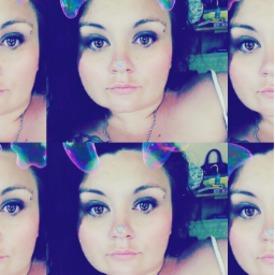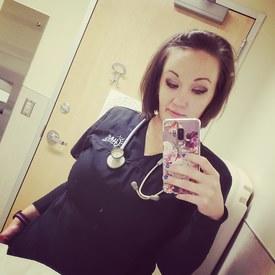Calorie counting

nicci288693
Posts: 73 Member
I started keto at 300 and am now at 278 and did not count calories. Should I be?
0
Replies
-
You're asking if you should count calories on a calorie counting website...
You have a lot to lose, so you can be a little losey goosey about it. However, over time your loss will slow down and might even stop. When I hit that point, that was when I quit eyeballing and using measuring cups, and started weighing to the gram.
You don't HAVE to count calories. However, you will need to monitor your intake in some way. And if calorie counting isn't for you, this site may not be either.0 -
ashliedelgado wrote: »You're asking if you should count calories on a calorie counting website...
You have a lot to lose, so you can be a little losey goosey about it. However, over time your loss will slow down and might even stop. When I hit that point, that was when I quit eyeballing and using measuring cups, and started weighing to the gram.
You don't HAVE to count calories. However, you will need to monitor your intake in some way. And if calorie counting isn't for you, this site may not be either.
I just don't want to over do it. No carbs and low calorie...I'm just not sure how to go about it. I'm new to dieting and am trying to get different point of views. I don't wanna make myself sick because I'm not well informed or doing the wrong things.0 -
Calorie counting isn't required for weight loss, but a calorie deficit is. How you get that deficit is up to you. If you are losing weight at the rate you want to be and feel okay with your current method, then I'd say you don't need to worry about calorie counting. If you're not, then tracking your foods to see how your calories look might be a good way to troubleshoot.2
-
Counting calories helps you visually see the calories you are consuming. In order to lose weight you need to eat at a deficit with keto you have created a calorie deficit. As you long as you eat less calories then you TDEE you will lose.2
-
Additionally, I know you haven't made use of most of the resources we've linked you to in the last few days, but there is a large and active keto community in the groups section called Low Carbers Daily or something like that. If you're finding the talk of calorie counting here to be overwhelming, it might help to connect with more of the people who are following the same diet plan as you.3
-
To echo the others, at this point, don't stress about it. Keto can help you restrict calories in another way, as for many people it is great for satiety, but you still want to make sure you are not not overdoing things (I am not any where near low carb, but if I eat a keto-type meal I am completely stuffed, so I keep it up my sleeve for days in which I don't have a lot of calories). If you stop losing, then you can consider tightening things up with calorie counting.
One thing to keep in mind is that it can "whoosh" off a lot of water weight in the beginning, but subsequent losses will not be as fast. Also, your weight may occasionally fluctuate upwards, but changes in water weight are a natural part of the process.1 -
If you're eating at a deficit, you're losing weight. There are some people here who find that they don't need to count calories on keto (or other ways of eating) because the foods that they're eating make them feel fuller than the way they ate in the past, so they're just naturally in deficit without having to track calories.
As long as you're losing weight and getting adequate nutrition, you're fine. What often happens, though, is that over time, the loss slows and stops due to,- As you get smaller, your body needs less fuel. To put this in context, my starting stats were Female, 5'3", 44 years old, 254 lbs. I told MFP I wanted to lose 1lb/week and it put me on 1720 calories. It's now ten months later and, while my gender and height are the same, I'm 45 and 173.6 as of last Sunday. And I'm currently on 1380 calories. If I were still eating the 1720 I started with, I suspect that I'd be at maintenance or close to it, which would have my rate of loss slowing or even 'plateauing'. (Not really, but that's what I'd think).
- With most weight-loss, there's a 'honeymoon' phase when weight loss happens really easily and you don't feel hungry despite taking in much less food than previously. Unfortunately, it doesn't last. So if you're taking reasonable portions and feeling full in a deficit, great. But what often happens is that hunger signals start getting stronger. If you don't know how many calories you're taking in, it's that much harder to gauge whether/what you can eat more and still be in deficit. I'm guessing that you're still weighing and measuring your food. But if you've been having... say, 100 grams of Protein Source A and you feel like you want more, but you don't know the calories, it's hard to know whether you can have another 50 grams or another 250 without knowing the energy value of the food.
- When the weight comes off and you're ready to transition to maintenance, it can be tricky to determine how much more to eat.
Full disclosure: I am a victim of 'portion creep', where if I don't weigh and measure and count calories, my portion sizes slowly increase over time. For me, counting calories is necessary. This is true for others on MFP and elsewhere. It's not true for everyone.
If just doing keto without counting calories is working for you, that's perfectly okay. And again, there are people who don't count calories, who used to count calories and then found that they could lose/maintain without doing so once they got a feel for what a portion looked like. If it should happen at some point that it doesn't work for you anymore, at least you know what might help.
(When I started MFP, I used measuring cups for solids because I always had. But I also watched the video that shows how inaccurate that can be and I told myself that if my weight loss seemed to stall, then weighing instead of measuring would be the first thing to look at. Even if I wasn't ready to do it initially, just knowing that it was a thing gave me a tool to think about.)
Good luck!0 -
estherdragonbat wrote: »If you're eating at a deficit, you're losing weight. There are some people here who find that they don't need to count calories on keto (or other ways of eating) because the foods that they're eating make them feel fuller than the way they ate in the past, so they're just naturally in deficit without having to track calories.
As long as you're losing weight and getting adequate nutrition, you're fine. What often happens, though, is that over time, the loss slows and stops due to,- As you get smaller, your body needs less fuel. To put this in context, my starting stats were Female, 5'3", 44 years old, 254 lbs. I told MFP I wanted to lose 1lb/week and it put me on 1720 calories. It's now ten months later and, while my gender and height are the same, I'm 45 and 173.6 as of last Sunday. And I'm currently on 1380 calories. If I were still eating the 1720 I started with, I suspect that I'd be at maintenance or close to it, which would have my rate of loss slowing or even 'plateauing'. (Not really, but that's what I'd think).
- With most weight-loss, there's a 'honeymoon' phase when weight loss happens really easily and you don't feel hungry despite taking in much less food than previously. Unfortunately, it doesn't last. So if you're taking reasonable portions and feeling full in a deficit, great. But what often happens is that hunger signals start getting stronger. If you don't know how many calories you're taking in, it's that much harder to gauge whether/what you can eat more and still be in deficit. I'm guessing that you're still weighing and measuring your food. But if you've been having... say, 100 grams of Protein Source A and you feel like you want more, but you don't know the calories, it's hard to know whether you can have another 50 grams or another 250 without knowing the energy value of the food.
- When the weight comes off and you're ready to transition to maintenance, it can be tricky to determine how much more to eat.
Full disclosure: I am a victim of 'portion creep', where if I don't weigh and measure and count calories, my portion sizes slowly increase over time. For me, counting calories is necessary. This is true for others on MFP and elsewhere. It's not true for everyone.
If just doing keto without counting calories is working for you, that's perfectly okay. And again, there are people who don't count calories, who used to count calories and then found that they could lose/maintain without doing so once they got a feel for what a portion looked like. If it should happen at some point that it doesn't work for you anymore, at least you know what might help.
(When I started MFP, I used measuring cups for solids because I always had. But I also watched the video that shows how inaccurate that can be and I told myself that if my weight loss seemed to stall, then weighing instead of measuring would be the first thing to look at. Even if I wasn't ready to do it initially, just knowing that it was a thing gave me a tool to think about.)
Good luck!
Thank you0
This discussion has been closed.
Categories
- All Categories
- 1.4M Health, Wellness and Goals
- 398.2K Introduce Yourself
- 44.7K Getting Started
- 261K Health and Weight Loss
- 176.4K Food and Nutrition
- 47.7K Recipes
- 233K Fitness and Exercise
- 462 Sleep, Mindfulness and Overall Wellness
- 6.5K Goal: Maintaining Weight
- 8.7K Goal: Gaining Weight and Body Building
- 153.5K Motivation and Support
- 8.4K Challenges
- 1.4K Debate Club
- 96.5K Chit-Chat
- 2.6K Fun and Games
- 4.8K MyFitnessPal Information
- 13 News and Announcements
- 21 MyFitnessPal Academy
- 1.6K Feature Suggestions and Ideas
- 3.2K MyFitnessPal Tech Support Questions




